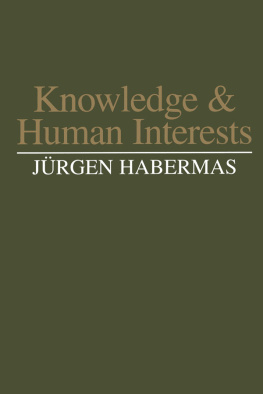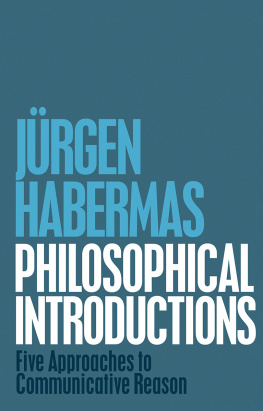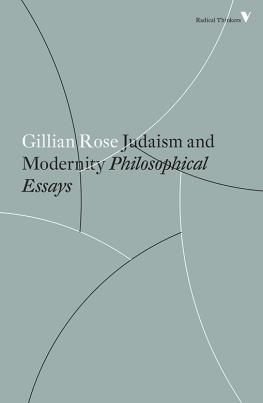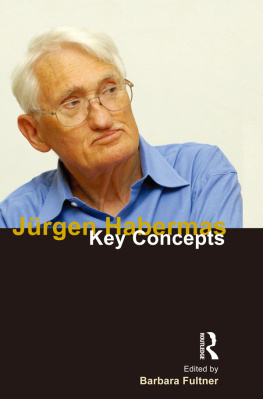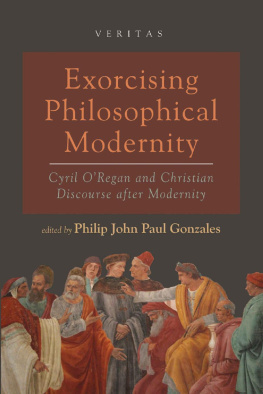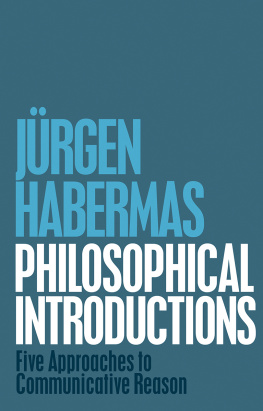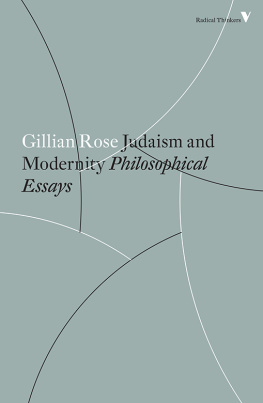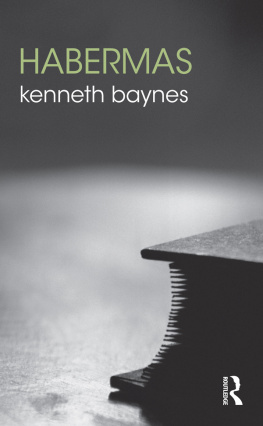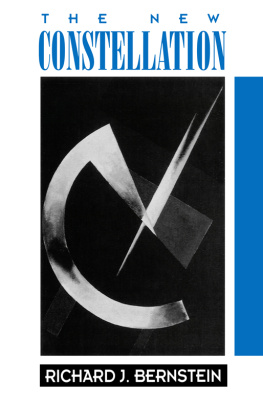Habermas - The Philosophical Discourse of Modernity
Here you can read online Habermas - The Philosophical Discourse of Modernity full text of the book (entire story) in english for free. Download pdf and epub, get meaning, cover and reviews about this ebook. year: 2015, publisher: Wiley, genre: Religion. Description of the work, (preface) as well as reviews are available. Best literature library LitArk.com created for fans of good reading and offers a wide selection of genres:
Romance novel
Science fiction
Adventure
Detective
Science
History
Home and family
Prose
Art
Politics
Computer
Non-fiction
Religion
Business
Children
Humor
Choose a favorite category and find really read worthwhile books. Enjoy immersion in the world of imagination, feel the emotions of the characters or learn something new for yourself, make an fascinating discovery.

The Philosophical Discourse of Modernity: summary, description and annotation
We offer to read an annotation, description, summary or preface (depends on what the author of the book "The Philosophical Discourse of Modernity" wrote himself). If you haven't found the necessary information about the book — write in the comments, we will try to find it.
Habermas: author's other books
Who wrote The Philosophical Discourse of Modernity? Find out the surname, the name of the author of the book and a list of all author's works by series.
The Philosophical Discourse of Modernity — read online for free the complete book (whole text) full work
Below is the text of the book, divided by pages. System saving the place of the last page read, allows you to conveniently read the book "The Philosophical Discourse of Modernity" online for free, without having to search again every time where you left off. Put a bookmark, and you can go to the page where you finished reading at any time.
Font size:
Interval:
Bookmark:
Contents

First published in 1985 as Der philosophische Diskurs der Moderne: Zwlf Vorlesungen, 1985 by Suhrkamp Verlag, Frankfurt-am-Main
This translation copyright 1987 by the Massachusetts Institute of Technology.
This edition first published 1987 by Polity Press in association with Blackwell Publishers, a Blackwell Publishing Company.
First published in paperback 1990
Reprinted 1992, 1994, 1995, 1998, 2002, 2005, 2007
Polity Press
65 Bridge Street
Cambridge CB2 1UR, UK
Polity Press
350 Main Street
Maldon, MA 02148, USA
All rights reserved. Except for the quotation of short passages for the purposes of criticism and review, no part of this publication may be reproduced, stored in a retrieval system, or transmitted, in any form or by any means, electronic, mechanical, photocopying, recording or otherwise, without the prior permission of the publisher.
Except in the United States of America, this book is sold subject to the condition that it shall not, by way of trade or otherwise, be lent, re-sold, hired out, or otherwise circulated without the publishers prior consent in any form of binding or cover other than that in which it is published and without a similar condition including this condition being imposed on the subsequent purchaser.
ISBN: 978-0-7456-0830-3 (pbk)
A CIP catalogue record for this book is available from the British Library.
For further information on Polity, visit our website: www.polity.co.uk
In the philosophical discourse of modernity, writes Habermas, we are still contemporaries of the Young Hegelians. Distancing themselves from Hegels attempt to replace the subject-centered reason of the Enlightenment with Absolute Knowledge, Marx and the other Left Hegelians already announced the desublimation of the spirit and a consequent disempowering of philosophy. Since that time, these tendencies have continued apace. The overwhelming impurity of reason, its unavoidable entanglement in history and tradition, society and power, practice and interest, body and desire, has prompted, among others, Nietzsches heroic proclamation of the end of philosophy, Wittgensteins therapeutic farewell, and Heideggers dramatic overcoming. The current end-of-philosophy debates are largely echoes of and variations upon themes developed in these earlier rounds. For French poststructuralism, which serves as the point of departure for these lectures, it is above all Nietzsche and Heidegger who furnish the inspiration and set the agenda. Habermas is concerned here to respond to the challenge posed by the radical critique of reason in contemporary French thought by reexamining the philosophical discourse of modernity from which it issues. His strategy is to return to those historical crossroads at which Hegel and the Young Hegelians, Nietzsche, and Heidegger made the fateful decisions that led to this outcome; his aim is to identify and clearly mark out a road indicated but not taken: the determinate negation of subject-centered reason by reason understood as communicative action.
That strategy and aim define the focus and compass of the lectures. They deal with modernity as a theme of philosophical, not aesthetic, discourse. There are, however, some significant overlappings, for the aesthetic critique of modernity has played a crucial role in the philosophical critique from Schiller and Romanticism to Nietzsche and poststructuralism. In particular, the realm of radical experience of experience set free from the constraints of morality and utility, religion and science opened up by avant-garde art has figured prominently in more recent attacks on the egocentric, domineering, objectifying, and repressing sovereign rational subject. From Nietzsche to Bataille, it has seemed to provide access to the outlawed other of reason, which typically furnishes, if often only implicitly, the criteria for that critique. Habermas also discusses earlier accounts of arts potential to reconcile the fragmented moments of reason, as well as Nietzsches and Heideggers variations on the theme of an aesthetically renewed mythology (Dionysus as the absent god who is coming).
But the enhanced significance of the aesthetic is only one facet of the philosophical discourse of modernity, which turns centrally on the critique of subjectivistic rationalism. The strong conceptions of reason and of the autonomous rational subject developed from Descartes to Kant have, despite the constant pounding given them in the last one hundred and fifty years, continued to exercise a broad and deep often subterranean influence. The conception of man they define is, according to the radical critics of enlightenment, at the core of Western humanism, which accounts in their view for its long complicity with terror. In proclaiming the end of philosophy whether in the name of negative dialectics or genealogy, the destruction of metaphysics or deconstruction they are in fact targeting the self-assertive and self-aggrandizing notion of reason that underlies Western logocentrism. The critique of subject-centered reason is thus a prologue to the critique of a bankrupt culture.
To the necessity that characterizes reason in the Cartesian-Kantian view, the radical critics typically oppose the contingency and conventionality of the rules, criteria, and products of what counts as rational speech and action at any given time and place; to its universality, they oppose an irreducible plurality of incommensurable lifeworlds and forms of life, the irremediably local character of all truth, argument, and validity; to the apriori, the empirical; to certainty, fallibility; to unity, heterogeneity; to homogeneity, the fragmentary; to self-evident givenness (presence), universal mediation by differential systems of signs (Saussure); to the unconditioned, a rejection of ultimate foundations in any form. Interwoven with this critique of reason is a critique of the sovereign rational subject atomistic and autonomous, disengaged and disembodied, potentially and ideally self-transparent. It is no longer possible, the critics argue, to overlook the influence of the unconscious on the conscious, the role of the preconceptual and nonconceptual in the conceptual, the presence of the irrational the economy of desire, the will to power at the very core of the rational. Nor is it possible to ignore the intrinsically social character of structures of consciousness, the historical and cultural variability of categories of thought and principles of action, their interdependence with the changing forms of social and material reproduction. And it is equally evident that mind will be misconceived if it is opposed to body, as will theory if it is opposed to practice: Subjects of knowledge are embodied and practically engaged with the world, and the products of their thought bear ineradicable traces of their purposes and projects, passions and interests. In short, the epistemological and moral subject has been definitively decentered and the conception of reason linked to it irrevocably desublimated. Subjectivity and intentionality are not prior to, but a function of, forms of life and systems of language; they do not constitute the world but are themselves elements of a linguistically disclosed world.
Another important strand in the radical critique of reason can be traced back to Nietzsches emphasis on the rhetorical and aesthetic dimensions of language. Thus, a number of critics seek to undercut philosophys traditional self-delimitation from rhetoric and poetics as reflected in the standard oppositions between logos and mythos, logic and rhetoric, literal and figurative, concept and metaphor, argument and narrative, and the like. Pursuing Nietzsches idea that philosophical texts are rhetorical constructs, they take aim at philosophys self-understanding of its discourse in purely logical, literal that is to say, nonrhetorical terms. They argue that this is achieved only at the cost of ignoring or suppressing the rhetorical strategies and elements of metaphor and other figurative devices that are nevertheless always at work in its discourse. And they seek actively to dispel the illusion of pure reason by applying modes of literary analysis to philosophical texts, exploiting the tensions between reason and rhetoric within them so as to undermine their logocentric self-understanding.
Next pageFont size:
Interval:
Bookmark:
Similar books «The Philosophical Discourse of Modernity»
Look at similar books to The Philosophical Discourse of Modernity. We have selected literature similar in name and meaning in the hope of providing readers with more options to find new, interesting, not yet read works.
Discussion, reviews of the book The Philosophical Discourse of Modernity and just readers' own opinions. Leave your comments, write what you think about the work, its meaning or the main characters. Specify what exactly you liked and what you didn't like, and why you think so.

